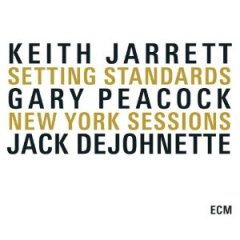Keith Jarrett - Setting Standards - New York Sessions (2007)
Keith Jarrett - Setting Standards - New York Sessions (2007)

CD 1
Standards Vol. 1
1. Meaning Of The Blues 9:23
2. All The Things You Are 7:44
3. It Never Entered My Mind 6:45
4. The Masquerade Is Over 5:57 play
5. God Bless The Child 15:32
CD 2
Standards Vol. 2
1. So Tender 7:15
2. Moon And Sand 8:59
3. In Love In Vain 7:07
4. Never Let Me Go 7:49
5. If I Should Lose You 8:29
6. I Fall In Love Too Easily 5:12
CD 3
Changes
1. Flying Part 1 16:03
2. Flying Part 2 14:45
3. Prism 6:31 play
Keith Jarrett, piano
Gary Peacock, bass
Jack DeJohnette, drums
It's hard to believe that Keith Jarrett's "standards" trio, with bassist Gary Peacock and drummer Jack DeJohnette, has been around for a quarter of a century. It's not just the pianist's longest lasting ensemble, but one of most permanent line-ups in jazz history.
To celebrate the occasion, ECM Records has released Setting Standards: New York Sessions, a three-CD set which brings together the entire output of the trio's first session, a remarkably fruitful one that resulted in not one, not two, but three releases—Standards, Vol. 1 (ECM, 1985), Standards, Vol. 2 (ECM, 1985) and Changes (ECM, 1984). The box set also includes a new essay, "The Art of Metamorphosis," by Peter Rüedi, and previously unpublished photos—past and present.
When the trio convened at New York's Power Station studio in January, 1983, they had actually intersected once before, on Peacock's classic Tales Of Another (ECM, 1977). But while Peacock's session was a set of all-original compositions by the bassist, Jarrett's consisted largely of standards culled from the Great American Songbook. It's unlikely that they could have predicted that not only would they still be making music together twenty-five years later, but that they'd still be making vital music largely based on a standards repertoire, with My Foolish Heart (ECM, 2007) being one of the finest live sets the trio has released, nearly on par with its touchstone live album, Still Live (ECM, 1988).
It's important, when reassessing this music, to consider the musical climate at the time. By 1983, an emerging backlash against the more experimental nature of 1960s and 1970s jazz was creating a new neo-conservatism, bolstered by emerging "young lions" including Wynton Marsalis. It might even be possible to consider Jarrett's move away from more overtly experimental works like the all-organ Invocations/The Moth And The Flame (ECM, 1981) and classically informed The Celestial Hawk (ECM, 1980) to be intentionally aimed at capturing some of the audience buying into a growing revisionist and reductionist jazz view, but that would be a mistake.
That Jarrett was giving up on formal writing was monumental enough to some, especially considering the consistently strong songbook he"d built with both his American and European Quartets of the 1970s—especially the latter, which was responsible for classic albums like the compositionally rich Belonging (ECM, 1974). But while Jarrett, Peacock and DeJohnette chose to tackle a repertoire of largely familiar material, from the very beginning their approach to it was anything but conventional, a key defining point that continues to this day.
Yes, this is a trio that can swing with the best of them, and approaches the material with no short supply instrumental prowess. But the same stream-of-consciousness freedom and attention to space that has imbued solo piano performances like the best-selling The Koln Concert (ECM, 1975) can be heard in Jarrett's trio, and its approach to well-heeled songs like the curiously light-yet-fiery "All The Things You Are." Sure, there's a defining set of changes, but when one considers the profoundly lyrical "Meaning Of The Blues"—controversial in itself as the opener to Standards, Vol. 1 by conveying the power of the trio through understatement and subtlety—and the more propulsive but no less thematically attentive "So Tender," which opens Standards, Vol. 2, it becomes clear that this is not a trio simply running down the changes.
In fact, while there are those who see structure as an inherently limiting construct, Jarrett's trio clearly views it as liberating. Rather than defining precisely how a song should be played, form provides nothing more than a common meeting place for the trio's conversation-like interplay. But unlike many free players who use it as a starting point that is quickly abandoned, this trio never loses sight of a song's framework. Freedom need not imply the abandonment of pulse, melody or harmony, a concept made abundantly clear in the climactic closer to Vol. 1, a fifteen-minute, gospel-tinged version of "God Bless The Child" that grooves hard, but provides not just ample delineated solo space for everyone, but the kind of infectious group interaction that set the bar high for this group from the get-go.
download (mp3 @320 kbs):
uploaded yandex 4shared mega solidfiles zalivalka cloudmailru filecloudio
Zmieniony (Piątek, 02 Styczeń 2015 10:14)








